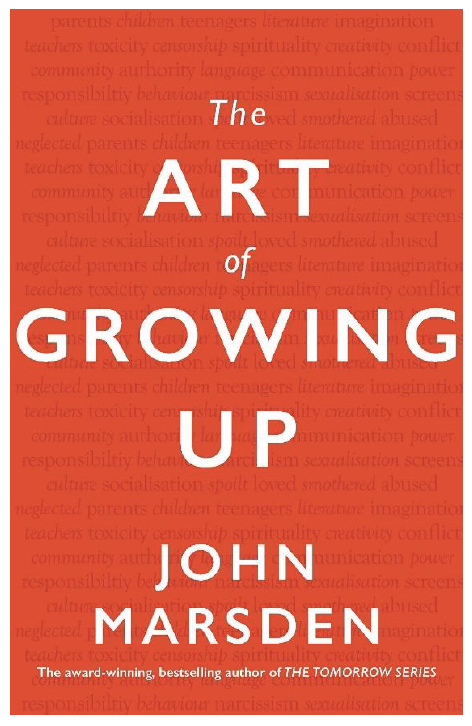The Art of Growing Up, by John Marsden
Inside his new book, John Marsden examines the following issues:
- Inadequate and/or damaging parenting is the major cause of addictive behaviour, depression, disproportionate anger, crime, helplessness and other ills. Yet we seem uncomfortable confronting this reality, thinking about it, and talking about it.
- We adults say we have all the sympathy in the world for abused children, but when some of these children, as they grow older, start to express the consequences of their abuse by attacking people or property or both, we howl in rage and demand violent punishments. Crime is symptomatic of illness, not of evil, but we don’t like that idea. Calling it evil is easy. It doesn’t require us to think, let alone come up with better solutions.
- Childhood gives us the foundations upon which adult life is built. If the foundations are strong, then a person can work their way through adversities, failures, accidents, disasters. If the foundations are weak, the person is likely to buckle at the knees (or worse) when things go wrong.
- The mental health problems of parents and children is the biggest problem for Australian schools in the 21st century. We’re seeing a pandemic of anxiety/panic among young people.
- Some of the biggest mistakes we’re seeing in 21st century parenting are:
- Treating the child as a golden being who must be showered with luxuries and refused nothing. ‘My child has never heard the word “no”‘, such parents boast. The result is children who become narcissistic, but also helpless, because the parents do everything for them.
- Treating the newborn child as a lump of clay to be shaped, trimmed, sculpted with precision, until the child perfectly matches the parents’ requirements.
- Failing to meet the needs of the ‘external’ child for food, clothing, sleep, doctoring, and/or failing to meet the needs of the ‘inner’ child, who must be taught values, authentic confidence, empathy and trust.
- Authoritarian parents who, because of their own insecurity, feel they must completely control the environment. Children are seen by such people as easy targets.
- The idealisation and sentimentalisation of children, portraying them as innocent, sweet, angelic, gorgeous, cute is followed inevitably by the demonisation of adolescents, who are portrayed as sullen, alienated, angry, selfish and lazy. These portraits are not only untrue; they cause severe difficulties for both children and adolescents.
- The child is not the property of the parents any more than a woman is the property of a man. A parent, for example, has no right to keep a child in ignorance. The child is absolutely entitled to knowledge – including knowledge of sex, drugs, technology, relationships, politics, religions, status, power, at, of course, appropriate levels of development.
- It’s nonsense for adults to complain about ‘the bullying problem’ in schools, though they love doing it! Bullying is found as much or more in adults as in children. When adults stop bullying each other, children will also stop. Much of the so-called ‘bullying” ‘in schools is actually children giving feedback to each other, in direct language and in a less sophisticated manner than adults may use. Telling someone: ‘You’re a greedy pig’ may be bullying, or it may be feedback to a child who has taken the last three slices of fairy bread at a birthday party.
- First-hand experiences are the most effective and powerful ways in which children can learn, but instead, we now offer – mostly –second-hand experiences: watching on TV a stranger having adventures, or playing computer games in which artificial characters have artificial experiences in artificial worlds.
- Rites of passage ceremonies have largely disappeared, or lost their power and meaning. This leaves young people in a kind of limbo.
- The damage caused by humans to this planet is now so serious that there is no possibility of it being reversed. The condition of Planet Earth is critical. Massive changes need to be made, and made immediately. As part of this process, a far more thoughtful approach to parenting and to education is essential.
The Art of Growing Up is published by Macmillan Australia and is available for $34.99 RRP.
About the Author
John Marsden has spent his adult life engaging with young minds – through both his award-winning, internationally bestselling young adult fiction and his work as one of Australia’s most esteemed and experienced educators. As the founder and principal of two schools, John is at the coalface of education and daily witness to the inevitable and yet still mysterious process of growing up.
Now, in this astonishing, insightful and hugely ambitious manifesto, John pulls together all he has learned from over thirty years’ experience working with and writing for young people. He shares his insights into everything – from the role of schools and the importance of education, to problem parents and problem children, and the conundrum of what it means to grow up and be ‘happy’ in the 21st century.
John Marsden has written more than 40 books, mostly for teenagers and children, including Tomorrow When the War Began, So Much to Tell You, and Letters from the Inside.
He has sold over five million books worldwide, and has won every major award in Australia for young people’s fiction.
South of Darkness, written for adults, won the Christina Stead Award for Best Novel of 2015.
In August 2019, John’s newest book, The Art of Growing Up, a non-fiction work about education and parenting, will be published.
John’s passionate interest in education led him to start two schools, Candlebark, situated on a vast forested estate near Romsey Victoria, and Alice Miller, at Macedon, a Year 7 to 12 school with a particular emphasis on the creative arts. The two schools enrolled 380 students in 2019.



